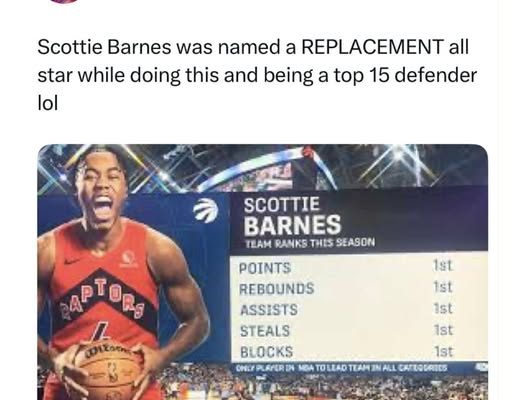Scottie Barnes has steadily become one of the most unique, versatile, and indispensable young stars in the NBA, yet he remains woefully underrated in league-wide conversations. Often overshadowed by flashier names or market-driven narratives, Barnes quietly continues to redefine what it means to be a franchise cornerstone. The 23-year-old Toronto Raptors forward does things on a nightly basis that few players at his age—or in the league—can replicate, yet his name rarely appears among the elite tier when fans and analysts rattle off their top forwards or rising stars. It’s almost as if his brilliance has become so routine that it’s now taken for granted. In a league obsessed with narratives, highlights, and scoring explosions, Barnes’ all-around impact and cerebral approach often go unnoticed. That needs to change.
From the moment he entered the league as the fourth overall pick in the 2021 NBA Draft, Barnes made his presence felt with a unique blend of size, skill, energy, and defensive prowess. He won Rookie of the Year over Cade Cunningham and Evan Mobley not just because of his stats, but because of how he impacted games. Barnes was a walking mismatch—able to guard all five positions, push the ball up the floor like a point guard, and facilitate offense from multiple areas on the court. He wasn’t just good—he was different. But what should have launched him into consistent stardom seems to have plateaued in the public eye, even as his game has expanded in virtually every measurable way.
The Raptors as a team have struggled since their 2019 championship run, undergoing coaching changes, roster instability, and losing franchise players like Kyle Lowry and Fred VanVleet. In the midst of that turbulence, Barnes became the one constant. He stepped into a bigger role without the benefit of a well-structured roster or clear offensive hierarchy. In fact, the chaos surrounding the Raptors has made it more difficult for casual fans to fully grasp what Barnes brings to the table. He isn’t being put in positions to rack up 30-point nights regularly, nor is he surrounded by elite shooters or rim protectors that would make his assist numbers pop or allow him to gamble more on defense. Instead, Barnes is often doing the heavy lifting on both ends of the floor while adjusting to new systems, teammates, and expectations.
What makes Barnes so criminally underrated is how seamlessly he fills gaps that many players actively avoid. He doesn’t demand shots, yet finds ways to be efficient. He doesn’t post gaudy steal or block numbers, yet his defense is elite due to his understanding of space, angles, and anticipation. He doesn’t dominate headlines, but he dominates matchups in ways that don’t always translate to box scores. He’s a player you need to watch for four quarters to truly understand his value. In a culture of highlights and Twitter clips, that’s an uphill battle. But for basketball purists and smart teams, Barnes is the type of player you build around.
His versatility is off the charts. At 6’9” with a 7’3” wingspan, he can bring the ball up the floor like a guard, initiate offense from the elbow like a big, and defend any position depending on the matchup. He’s one of the few players in the league who could start at any position 1 through 5 and not look out of place. That’s not hyperbole—it’s reality. He can guard your point guard full court, switch onto your power forward, or serve as a weak-side rim protector. He can facilitate like Draymond Green, rebound like a power forward, and occasionally take over as a scorer when needed. There just aren’t many players with that type of versatility, and even fewer under 25 years old.
Barnes’ numbers tell a compelling story even if they don’t scream superstardom at first glance. In his third season, he averaged close to 20 points, 8 rebounds, and 6 assists per game—an incredibly rare stat line that only a handful of NBA players ever reach. Those numbers put him in the company of perennial All-Stars, yet he receives a fraction of the attention. Why? Part of it is market size—Toronto doesn’t generate the same constant coverage as a New York or Los Angeles franchise. Part of it is style—Barnes isn’t a volume shooter or a relentless scorer. But mostly, it’s because we’ve become desensitized to well-rounded players who don’t fit neatly into the “superstar scorer” mold. We fail to appreciate what they do until it’s gone.
Defensively, Barnes is one of the most switchable and disruptive players in the game. He doesn’t get enough love for how he can toggle between guarding guards and bigs, often in the same possession. His motor is relentless, his instincts are sharp, and he rarely takes possessions off. In an era where many young players struggle with consistency on defense, Barnes brings it every night. And yet, when discussions arise about the league’s best defenders or two-way players, his name is rarely mentioned. It’s as if people assume his effort and discipline are just part of his “role” rather than elite traits that separate good players from great ones.
Offensively, Barnes continues to add new wrinkles. His jumper, once considered a weakness, has improved steadily. His court vision is elite, especially for a player his size. He sees plays before they happen, anticipates where teammates will be, and passes with both flair and function. He’s unselfish to a fault, sometimes deferring when he could take over. But that’s also part of what makes him so valuable—he elevates those around him. He doesn’t just chase stats; he plays winning basketball. If the Raptors had a more structured system or more reliable floor spacing, Barnes’ assist numbers would likely skyrocket. He’s already shown flashes of being a legitimate point-forward, capable of orchestrating offense with calm and creativity.
The most frustrating part about the lack of recognition for Barnes is that he’s producing elite-level impact with limited support. Very few 23-year-olds are tasked with leading a rebuilding team, managing expectations, and simultaneously improving their game across the board. And even fewer do it with the humility and professionalism that Barnes exhibits. He doesn’t complain, doesn’t showboat, and doesn’t demand attention. He just works. He shows up, leads by example, and does what needs to be done. That should be celebrated, not overlooked.
One could argue that the Raptors have not done enough to maximize Barnes’ potential. Poor spacing, constant roster churn, and a lack of a true offensive identity have put unnecessary pressure on him to be everything all at once. While other young stars benefit from playing alongside All-Stars or in optimized systems, Barnes has often been asked to carry too much weight with too little help. And yet, he doesn’t fold. He adapts. He evolves. That’s the mark of a true franchise player, whether the national spotlight sees it or not.
There’s also a leadership quality to Barnes that goes underappreciated. Despite his youth, he commands respect from veterans and younger teammates alike. He competes with joy and intensity, bringing energy to every game, every quarter, and every play. He understands when to assert himself and when to get others involved. That balance is rare for someone in their early 20s. He doesn’t hunt shots or force the action—he lets the game come to him, then bends it in his favor.
With the NBA shifting toward positionless basketball and valuing players who can do a bit of everything, Scottie Barnes should be the prototype. And yet, he’s more often labeled as “promising” or “developing” than recognized for what he already is—an elite two-way player capable of impacting every aspect of the game. He’s not flashy like Ja Morant, not a scoring machine like Luka Dončić, and not a social media darling like LaMelo Ball. But what he lacks in viral moments, he makes up for in winning plays, defensive stops, unselfish passes, and unmatched effort.
In a league that often measures greatness by points per game or how many times a player goes viral, Scottie Barnes reminds us that basketball is more than stats and narratives. It’s about impact. It’s about versatility. It’s about showing up every night and making your team better in every way possible. That’s what he does. That’s who he is.



